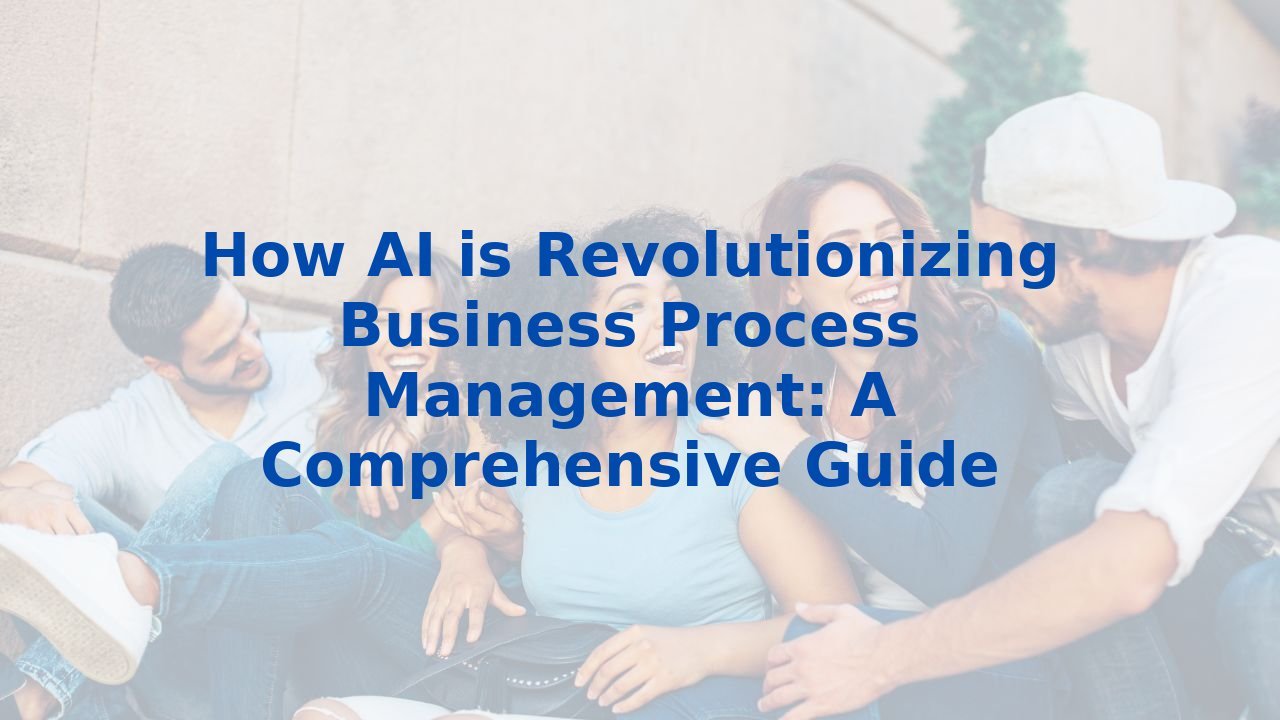How AI is Revolutionizing Business Process Management: A Comprehensive Guide
How AI is Revolutionizing Business Process Management: A Comprehensive Guide
In the fast-paced world of modern business, the need for effective process management has never been more critical. Business Process Management (BPM) is at the heart of every organization, serving as the backbone for operational efficiency and productivity enhancement. With the advent of artificial intelligence (AI), we're witnessing a transformation that goes beyond mere improvements to facilitate a radical shift in how businesses approach BPM.
1. Process Discovery: Unveiling Hidden Efficiencies
AI-driven process discovery is not just an advancement; it’s a game changer. By analyzing vast amounts of operational data, AI illuminates existing workflows and highlights inefficiencies that may elude human perception. Traditional methods, which rely heavily on manual observation and employee input, can be time-consuming and prone to bias. In contrast, AI’s ability to process and categorize data quickly provides a fresh, objective view of organizational processes, paving the way for enhanced performance.
2. Process Mapping: Creating a Blueprint for Success
Once the inefficiencies are identified, the journey continues with AI process mapping. This phase takes insights from process discovery and translates them into actionable blueprints. Employing machine learning and data analytics, AI visualizes workflows, revealing how processes interconnect and spot bottlenecks. The outcome is a living document that evolves, keeping process maps current and accurately reflecting operational realities.
3. Process Automation: The Workhorse of Efficiency
Process automation represents one of AI's most potent contributions to BPM. Through AI-powered Robotic Process Automation (RPA), repetitive tasks that once drained human resources can now be executed flawlessly, 24/7. From data entry to handling customer service inquiries, these automated solutions deliver remarkable accuracy while freeing human employees to engage in strategic initiatives that drive innovation and business growth.
4. Continuous Improvement: The Path Forward
AI facilitates a culture of continuous improvement by offering real-time feedback and data-driven recommendations. Organizations can leverage AI's insights to perpetually refine processes, ensuring that BPM strategies align seamlessly with evolving business objectives and market demands. This iterative approach fosters adaptability, a crucial trait in today’s dynamic business environment.
5. Data Analysis: Speeding Up Decision Making
As data volumes grow exponentially, the ability to quickly analyze and derive actionable insights becomes a competitive edge. AI streamlines data analysis, allowing organizations to identify trends, predict outcomes, and uncover root causes with unprecedented speed. By automating intricate data tasks, businesses are empowered to make quicker, more informed decisions that can have transformative impacts.
6. HR and Sales Enhancements
AI's reach extends to human resources and sales, cultivating objectivity and enhancing employee experiences. With the ability to synthesize data points like performance metrics, market trends, and budget constraints, AI helps HR professionals make competitive and fair compensation offers. On the sales front, AI optimizes the sales process by automating routine tasks, suggesting effective sales channels, and prioritizing leads for higher conversion rates.
7. Real-Time Monitoring and Optimization
The capability to monitor processes in real-time through AI enables organizations to stay one step ahead. Immediate insights into process status mean that businesses can act swiftly to address issues as they arise. Whether it’s identifying unusual delays or errors, AI helps pinpoint problems, enabling proactive rather than reactive solutions.
8. Benefits of Training Employees for AI
An essential factor to unlocking AI's full potential lies in training employees to work with AI technologies effectively. Providing your team with the necessary skills to interpret data-driven insights and embrace AI tools is key to an organization’s success. When employees are well-versed in AI, they can leverage the technology to elevate their work, leading to not just individual growth but also fostering a more innovative organizational culture.
Conclusion
The incorporation of AI into business process management is not merely an enhancement but a revolution that is reshaping how organizations operate. From unveiling hidden efficiencies and automating tasks to fostering continuous improvement and enabling real-time decision-making, AI is the catalyst for a new era of BPM. However, for the benefits of AI to be fully realized, it’s imperative that organizations invest in training their workforce effectively. With the right tools and skills in hand, the road to sustained performance enhancement and long-term success is wide open.



